|
|
|
Sort Order |
|
|
|
Items / Page
|
|
|
|
|
|
|
| Srl | Item |
| 1 |
ID:
110876


|
|
|
|
|
| Publication |
2012.
|
| Summary/Abstract |
Reacting to Iraq's invasion and annexation of Kuwait, two European states, the United Kingdom and France, contributed large forces and participated in land, air, and sea operations. The contributions of these states varied considerably in their composition and role. The United Kingdom deployed as many forces (45,000 personnel) as the country could manage, while France sent a significant force (15,000) that fell short of its potential. Once in Arabia, the British played a major role in coalition planning, while the French remained operationally aloof. Finally, when it came to launch offensive operations, British forces were central to the coalition's riskiest endeavors, such as special forces raids and preparing a fake amphibious invasion, while French forces played a credible, but less dangerous role. This article tests the ability of realism and historic institutionalism to explain these different responses to the 1990-91 Gulf Crisis. Although realism appears a priori to possess a high degree of explanatory power, a detailed process tracing analysis reveals that historical institutionalism can better account for the different outcomes observed.
|
|
|
|
|
|
|
|
|
|
|
|
|
|
|
|
| 2 |
ID:
095497


|
|
|
|
|
| Publication |
2010.
|
| Summary/Abstract |
This article focuses on a fourfold distinction among international relations approaches to security and peace (offensive realism, defensive realism, defensive liberalism and offensive liberalism), which is applied to understand differing regional dynamics of conflict resolution, particularly in two key regions: Europe and the Middle East. The shift from realist to liberal assumptions, it is argued here, is the foundation for conflict resolution. The combined effect of the realist mechanisms produced 'cold peace' in Europe, while the liberal strategies warmed the peace considerably, eventually producing a 'high-level warm peace'. More specifically, it was overlooked offensive liberal mechanisms which made an especially major contribution to the emergence of warm peace on the continent through the successful imposition of democratization on the key state for European security, Germany. Defensive liberal strategies then played a very useful supportive role in warming the regional peace. In the Middle East, in contrast, some of the conditions for the application of the realist approaches emerged after the 1973 war, and even then only in the Israeli-Egyptian context, and somewhat more broadly after the end of the Cold War and the 1991 Gulf War. But the conditions for liberal strategies are still missing even though a defensive liberal strategy has been tried in the l990s and an offensive liberal strategy was applied since 2003. Thus, only a cold peace could emerge, and even that only partially due to the relative weakness of the realist mechanisms in the Middle East in comparison to the Western European case during the Cold War.
|
|
|
|
|
|
|
|
|
|
|
|
|
|
|
|
| 3 |
ID:
100566
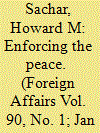

|
|
|
|
|
| Publication |
2011.
|
| Summary/Abstract |
The Israelis and the Palestinians will never find peace if they are left to negotiate on their own. As has been the case throughout history, great-power leadership is the missing ingredient. Washington must lead the way in enforcing a final-status settlement.
|
|
|
|
|
|
|
|
|
|
|
|
|
|
|
|
| 4 |
ID:
053969


|
|
|
|
|
| Publication |
Hampshire, macmillan Press, 1997.
|
| Description |
vi, 362p.
|
| Standard Number |
033366633X
|
|
|
|
|
|
|
|
|
|
|
|
Copies: C:1/I:0,R:0,Q:0
Circulation
| Accession# | Call# | Current Location | Status | Policy | Location |
| 039184 | 355.031/BEN 039184 | Main | On Shelf | General | |
|
|
|
|
| 5 |
ID:
051229
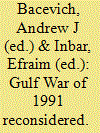

|
|
|
|
|
| Publication |
London, Frank Cass, 2003.
|
| Description |
xii, 186p.pbk
|
| Series |
BESA Studies in International Security
|
| Standard Number |
0714683051
|
|
|
|
|
|
|
|
|
|
|
|
Copies: C:1/I:0,R:0,Q:0
Circulation
| Accession# | Call# | Current Location | Status | Policy | Location |
| 048231 | 956.70442/BAC 048231 | Main | On Shelf | General | |
|
|
|
|
| 6 |
ID:
110318
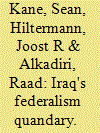

|
|
|
|
|
| Publication |
2012.
|
| Summary/Abstract |
WITH U.S. combat troops out of Iraq and that country facing an uncertain future, many challenges hover over the lands of old Mesopotamia. The most ominous is the unsettled struggle over power, territory and resources among the country's political elites. While often described in straightforward ethnic and sectarian terms, this strife has gone through many phases. Various alliances have come together and broken apart as the power struggle has shifted from a sectarian street war to heightened tensions between Baghdad and the Kurdistan Regional Government (KRG) in Erbil. Most recently, the main axis of confrontation has been between Prime Minister Nouri al-Maliki's Shia-led government and its putative governing partner, the mostly Sunni Iraqiya list.
|
|
|
|
|
|
|
|
|
|
|
|
|
|
|
|
| 7 |
ID:
123833
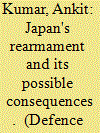

|
|
|
| 8 |
ID:
128605
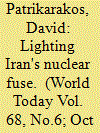

|
|
|
| 9 |
ID:
091142
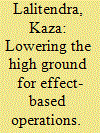

|
|
|
|
|
| Publication |
2009.
|
| Summary/Abstract |
The dawn of the space age set in motion the wheels of militarisation of space by the superpowers. They were soon joined by other nations that could afford the technology either through collaboration or indigenisation.While space has been utlised as a force enabler since the decade of the 1960's it was only during the 1991 Gulf War that the true potential of space as a force multiplier for military operations was realised.
|
|
|
|
|
|
|
|
|
|
|
|
|
|
|
|
| 10 |
ID:
106642
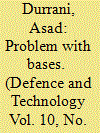

|
|
|
| 11 |
ID:
097105
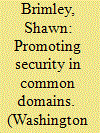

|
|
|
|
|
| Publication |
2010.
|
| Summary/Abstract |
Over the last several years, it has become apparent that the domains facilitating all international interaction-sea, air, space, and cyberspace-are increasingly congested, contested, and complex. These domains constitute the connective tissue of an ever more interconnected international system. It should, therefore, come as no surprise that the level of activity and investment by both state and non-state actors is rapidly increasing. Satellites are being launched, submarines are being built, long-range aircraft procured, and powerful cyberspace capabilities are being maintained by states that only two decades ago were just beginning to employ rudimentary computer systems. Non-state actors, ranging from pirates off Somalia to cyber "hacktivists" to the growing number of commercial players that own and operate satellites, further complicate this landscape.
|
|
|
|
|
|
|
|
|
|
|
|
|
|
|
|
| 12 |
ID:
094594
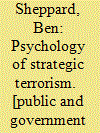

|
|
|
|
|
| Publication |
London, Routledge, 2009.
|
| Description |
xiv, 248p.
|
| Standard Number |
9780415471954
|
|
|
|
|
|
|
|
|
|
|
|
Copies: C:1/I:0,R:0,Q:0
Circulation
| Accession# | Call# | Current Location | Status | Policy | Location |
| 054847 | 363.3251561/SHE 054847 | Main | On Shelf | General | |
|
|
|
|
| 13 |
ID:
122206
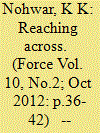

|
|
|
| 14 |
ID:
117212
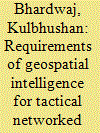

|
|
|
| 15 |
ID:
116607
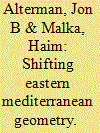

|
|
|
|
|
| Publication |
2012.
|
| Summary/Abstract |
The security architecture that the United States helped establish after the Cold War in the Eastern Mediterranean is crumbling. That architecture emphasized two triangular partnerships: U.S.-Turkey-Israel and U.S.-Egypt-Israel. Each had its origin in the Cold War and gained new emphasis afterwards as a cornerstone of U.S. efforts to promote Middle Eastern stability. Yet the evolution of internal politics in Turkey over the last decade, combined with more recent shifts in Egypt, have brought to the fore civilian politicians who are openly critical of such partnerships and who have sidelined the partnerships' military proponents. The demise of these two triangles has profound implications for Israeli security, as well as for the U.S. military and diplomatic role in the Eastern Mediterranean. The changing geometry of U.S. relationships in the Eastern Mediterranean is part of a set of broader trends that make it more difficult for the United States to shape outcomes and set agendas in the region. This change in particular is likely to force the United States to emphasize bilateral relationships and ad hoc direct action in the future, placing a greater demand on ongoing U.S. management than has been the case in the past.
|
|
|
|
|
|
|
|
|
|
|
|
|
|
|
|
| 16 |
ID:
091994
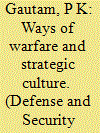

|
|
|
|
|
| Publication |
2009.
|
| Summary/Abstract |
A country-specific way of war and a country-specific strategic culture have long been a topic of debate. While the twentieth century, which witnessed two World Wars and a number of limited conflicts with a way of war characterized by conflict between nations, the same can not be said today when globalization and the rapid transmission of knowledge have amplified and accelerated the learning process of all militaries.
|
|
|
|
|
|
|
|
|
|
|
|
|
|
|
|
|
|
|
|
|